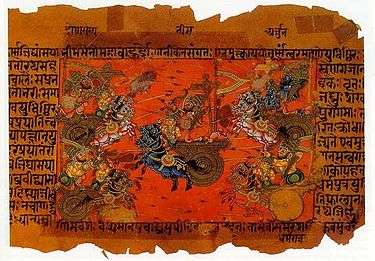Vajradatta
Vajradatta was son and successor of the king Bhagadatta, third in line to throne of Naraka dynasty of Pragjyotisha Kingdom. Vajradatta had studied four vedas along with Angas, and the Nitishastras of Brihaspati and Shukra.[1] Vajradatta is mentioned in epics as powerful as Indra, speedy like Vajra and who pleased the performer of hundred sacrifices, who is Indra again, in battle. He said to possess bolt-like lustre and conquered enemies like Indra.
Role in Mahabharata
The Aswamedha Parva of Mahabharata gives account of Vajradatta.[2] He was not able to accompany his father Bhagadatta in Mahabharata war, as he was child then.[3] King Yudhishthira organised Aswadeha Parva, and Arjuna was appointed as guard of the Aswamedha horse. Horse after transversing different countries reached east to Pragjyotisha, then ruled by the Vajradatta. Vajradatta made an attempt to hold the horse to avenge his fathers humiliation in Mahabharata war in hands of Arjuna. He was defeated by Arjuna, after a prolong battle.[4]
Mention in Kamarupa inscriptions
In Kamarupa inscriptions, the Naraka, Bhagadatta and Vajradatta were mentioned as ancestors of Kamarupa kings. One such inscription is Nidhanpur inscription of Bhaskar Varman.[5]
Epics
Like in other epics, Vajradatta was also mentioned in Kalika Purana and Harshacharita. In Kalika Purana, Naraka said to have sons namely Bhagadatta, Mahasirsa, Madavan and Sumali and Vajradatta and Pushpadatta were sons of Bhagadatta.[6] In Harshacharita Vajradatta is placed after Bhagadatta and Pushpadatta, as ancestors of king Bhaskar Varman.
See also
References
- ↑ Kusuman, K.K (1990). A Panorama of Indian Culture. p. 349.
- ↑ Ganguli, Kisari Mohan (2014). The Mahabharat, Book 14:Aswamedha Parva. p. 242.
- ↑ Caudhuri, Nisipada (1985). Historical Archaeology of central Assam. p. 287.
- ↑ Prakash, Col Ved (2007). Encylopaedia of North-East India. p. 536.
- ↑ Sharma, Sharma, Suresh Kant, Usha (2005). Discovery of North-East India. p. 379.
- ↑ Choudhury, Pratap Chandra (1966). The history of civilisation of the people of Assam. p. 510.
